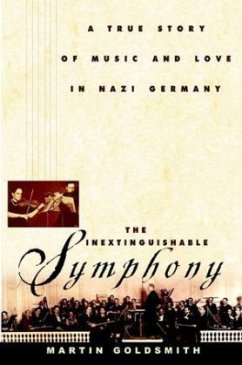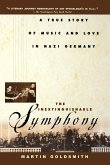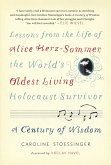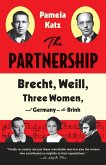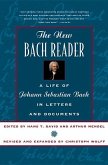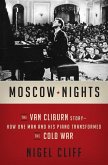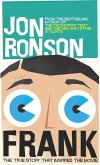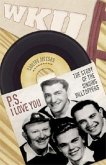Die faszinierende Geschichte einer wenig bekannten Facette des Holocaust! Unter der Schirmherrschaft von Goebbels? Propagandaministerium wurde im Dritten Reich der jüdische Kulturbund gegründet, in dem Musiker, Schauspieler und Opernkünstler organisiert wurden ? um der Welt zu demonstrieren, wie "gut" man die Juden im Nazideutschland behandelte. Im Laufe der Jahre wurde der Kulturbund zur Zufluchtsstätte jüdischer Künstler. Martin Goldsmith erzählt hier die Lebensgeschichte seiner Eltern, des Flötisten Günter Goldschmidt und der Violinistin Rosemarie Gumpert. Eine Kombination aus musikalischer Liebesgeschichte und dem bewegenden Zeugnis vom Mut jener Künstler, die ihren Beruf unter unvorstellbaren Bedingungen ausübten.
The Israeli Holocaust scholar Yehuda Bauer once remarked that when you write about the Holocaust, you should remember that you are writing in front of burning children. What he meant was that the murder of six million Jews is a subject that requires a unique sort of humility-a warning that seems especially resonant today, now that redemptive Holocaust tales are suddenly in fashion. I'm referring to films such as 'Schindler's List,' the story of a transformed Nazi who just wants to save Jews, and 'Life Is Beautiful,' where the message appeared to be that you shouldn't let a genocide prevent you from having a good time.
Of course, the urge to find even a flicker of light in this darkest of human tragedies is an understandable one. Perhaps more to the point. Holocaust stories that are, in some utterly improbable way, a little bit uplifting or empowering are part of the larger saga-albeit a very, very small part of it.
Such is the case with Rich Cohen's The Avengers and Martin Goldsmith's The Inextinguishable Symphony, the latest literary contributions to this genre. The Avengers is the tale of the Vilna partisans, Zionists who tunneled out of the Jewish ghetto before the Nazis could round them up and kill them...
The Inextinguishable Symphony is, on its pace, less dramatic. The author, Martin Goldsmith, reconstructs the lives of his parents, two young German Jewish musicians who fell in love and married during the war. His mother, a violist, and his father, a flutist, were both members of the Kulturbund, a Jewish cultural organization that allowed the Nazis to purge their various arts entities of Jews without sounding international alarm bells. It was a crude form of segregation, and the Nazis closely monitored all performances to ensure that they were in no way political and that, above all, they didn't sully any cherished German ideals, but the Kulturbund nevertheless became a cultural and spiritual refuge for a people with nowhere else to go.
War and revenge versus music and love:
The two books are opposite sides of a single coin. Cohen's is self-consciously muscular, macho, the story of a courageous group of people who refused to accept the fate handed to them. Goldsmith's is more sensitive, more humanizing: Here are two young people who did the best they could to simulate a normal life within unthinkable circumstances. . .
Goldsmith, by contrast, is conscientious about alerting the reader to his flights of imagination, and his motives are clear. He is not writing compensatory history; he wants to know what happened to his parents before they escaped to America. But more than that, he wants to understand how they became who they were: it's a literary journey reminiscent of Art Spiegelman's in Maus.
In the book's most moving passage. Goldsmith describes his father fleeing Berlin during Kristallnacht, the murderous rampage during which the Nazis torched synagogues and razed Jewish-owned stores. Goldsmith's father boards an overnight train to the small town where his future wife lived with her mother and father, a music teacher. He shows up at their home early in the morning and unannounced; he is out of breath and desperate to alert her family to the imminent danger, but her father only dismisses the going's on as the work of some drunken hooligans.
Goldsmith's prose is spare and simple, as if this were just a little sliver of the huge, terrifying story of the Holocaust-and that is precisely the point. This is the humility about which Yehuda Bauer was speaking.
Renewed b/JONATHAN MAHLER
--Jonathan Mahler is a senior writer and editor at Talk Magazine
Of course, the urge to find even a flicker of light in this darkest of human tragedies is an understandable one. Perhaps more to the point. Holocaust stories that are, in some utterly improbable way, a little bit uplifting or empowering are part of the larger saga-albeit a very, very small part of it.
Such is the case with Rich Cohen's The Avengers and Martin Goldsmith's The Inextinguishable Symphony, the latest literary contributions to this genre. The Avengers is the tale of the Vilna partisans, Zionists who tunneled out of the Jewish ghetto before the Nazis could round them up and kill them...
The Inextinguishable Symphony is, on its pace, less dramatic. The author, Martin Goldsmith, reconstructs the lives of his parents, two young German Jewish musicians who fell in love and married during the war. His mother, a violist, and his father, a flutist, were both members of the Kulturbund, a Jewish cultural organization that allowed the Nazis to purge their various arts entities of Jews without sounding international alarm bells. It was a crude form of segregation, and the Nazis closely monitored all performances to ensure that they were in no way political and that, above all, they didn't sully any cherished German ideals, but the Kulturbund nevertheless became a cultural and spiritual refuge for a people with nowhere else to go.
War and revenge versus music and love:
The two books are opposite sides of a single coin. Cohen's is self-consciously muscular, macho, the story of a courageous group of people who refused to accept the fate handed to them. Goldsmith's is more sensitive, more humanizing: Here are two young people who did the best they could to simulate a normal life within unthinkable circumstances. . .
Goldsmith, by contrast, is conscientious about alerting the reader to his flights of imagination, and his motives are clear. He is not writing compensatory history; he wants to know what happened to his parents before they escaped to America. But more than that, he wants to understand how they became who they were: it's a literary journey reminiscent of Art Spiegelman's in Maus.
In the book's most moving passage. Goldsmith describes his father fleeing Berlin during Kristallnacht, the murderous rampage during which the Nazis torched synagogues and razed Jewish-owned stores. Goldsmith's father boards an overnight train to the small town where his future wife lived with her mother and father, a music teacher. He shows up at their home early in the morning and unannounced; he is out of breath and desperate to alert her family to the imminent danger, but her father only dismisses the going's on as the work of some drunken hooligans.
Goldsmith's prose is spare and simple, as if this were just a little sliver of the huge, terrifying story of the Holocaust-and that is precisely the point. This is the humility about which Yehuda Bauer was speaking.
Renewed b/JONATHAN MAHLER
--Jonathan Mahler is a senior writer and editor at Talk Magazine

